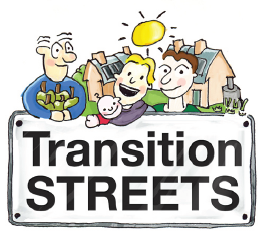10 May 2011
Does engagement with Transition make people happier and healthier?
 Does engaging in Transition lead to people being healthier and happier? This is a question that has often been speculated on, and one that Janet Richardson, Professor of Health Service Research, Faculty of Health of the University of Plymouth has explored before, but as part of the Transition Together and Transition Streets initiatives happening in Totnes, she has just produced ‘Assessing the potential health impacts of a Transition town initiative: a health impact assessment of Totnes Transition Together and Transition Streets: a short report prepared for Transition Town Totnes, May 2011’, the first piece of research I know of that looks at this question. It is very short, and largely speculative, but it opens the door for more detailed study of this most fascinating of areas.
Does engaging in Transition lead to people being healthier and happier? This is a question that has often been speculated on, and one that Janet Richardson, Professor of Health Service Research, Faculty of Health of the University of Plymouth has explored before, but as part of the Transition Together and Transition Streets initiatives happening in Totnes, she has just produced ‘Assessing the potential health impacts of a Transition town initiative: a health impact assessment of Totnes Transition Together and Transition Streets: a short report prepared for Transition Town Totnes, May 2011’, the first piece of research I know of that looks at this question. It is very short, and largely speculative, but it opens the door for more detailed study of this most fascinating of areas.
Chris Johnstone
10 May 4:19pm
Dear Rob,
This is great to see, thank you.
A useful principle of change is ‘find the want behind the should’. When action for sustainability is seen as a pathway to greater happiness and wellbeing, it grows in attractiveness. That’s why this type of study, and, for example, Tim Kasser’s work showing that voluntary simplicity increases happiness while materialism makes people miserable, is so important.
In a similar vein, here’s something I wrote that Action for Happiness published yesterday.
http://www.actionforhappiness.org/news/afterglow,-altruism-and-adventure
With you in this wonderful transition adventure
Chris.
Chris Johnstone
Author of Find Your Power – a toolkit for resilience and positive change
James R. Martin
10 May 5:25pm
It is now well known that physical and emotional well-being are deeply intertwined, so I’d not be surprised to learn that a sense of belongingness in genuine community (by which I mean people *helpfully* living together) tend to be both happier and healthier. That they should be in various ways more secure seems also rather obvious.
True wealth, I think, is best understood in relation to community well-being, not just individual well-being, as that word is now most commonly used. A look at the etymology of the word “wealth” is instructive. It comes from the same root as health, heal and well. I see the Transition movement as addressing our need for real wealth in a world which has lost sight of what true wealth really is.
James R. Martin
10 May 5:28pm
Correction (sorry!):
I meant to type:
” … so I’d not be surprised to learn that people living with a sense of belongingness in genuine community … “
Brendan Barrett
11 May 7:16am
Rob,
Thanks for sharing this. I agree that this kind of study is very important. However, I would have like to have seen a more extensive survey, including local people who are not directly involved in Transition Totnes for comparative purposes. Nevertheless the points raised in the study are very interesting.
Here in Japan we have been considering whether the Transition approach could provide valuable lessons for the rebuilding efforts in the Tohoku region after the Tsunami. One aspect would be to ensure that the rebuilding is a community led initiative and based on a positive vision of the future. At the same time, considerable attention needs to be paid to the health (mental and physical) implications for those affected by the Tsunami. After the Kobe earthquake, for instance, the suicide rate in the community increased dramatically. Yes, they built back some wonderful new housing areas (called Happy Active Town) but it was difficult to build back the sense of community and to remove the feelings of isolation.
While the Transition approach revolves around preparing for future challenges like peak oil and climate change, there may be elements of the approach that can help when recovering from disaster and rebuilding. I am wondering what ideas may be transferable.